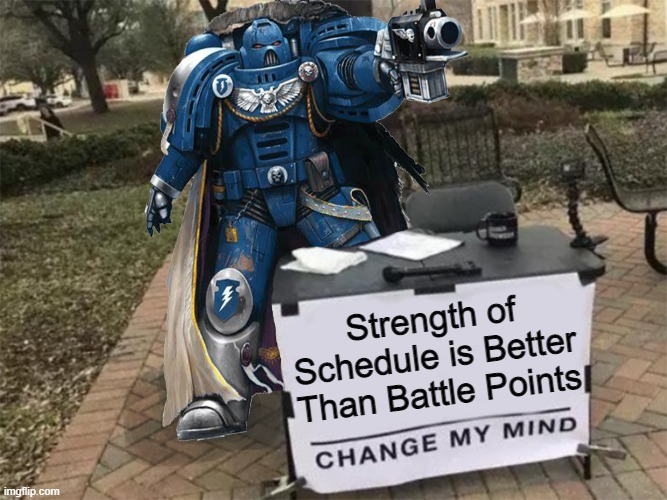I played a practice game for an upcoming RTT with a very good player in my local meta, and as his Necrons stomped on my poor Blood Angels we had a very interesting conversation. During the game, we got into a conversation about the World Cup. Mainly the conversation revolved around how these incredibly talented athletes threw themselves to the ground and put on Oscar winning performances at the slightest hint that they may have been fouled. A lot of people joke that soccer players aren’t tough, but that obviously isn’t the case. These dudes run for miles, throw their head up to hit the ball, and slide tackle other players when the game calls for it, so why do they all of a sudden become human water fountains of tears when someone from the other team gently brushes their jersey? The answer is the game rewards this kind of behavior. If throwing a mini-tantrum on the field can get your team an advantage than it is worth looking a little ridiculous. Gamesmanship, as this is generally known as, is no stranger to competitive 40k.
Many 40k tournaments use Battle Points as a tie breaker within the rankings, and this can lead to some situations exactly like the acting we see displayed on the soccer field. Battle Points incentivizes beating your opponent with as many points as possible, but it also can be advantageous to keep your score low in order to not play the highest scoring players in the next round. The 40k community saw this occur at a tournament where a player was winning a game handedly, but then moved off Objectives to lower their score in order to not play the highest scoring players in the next round. This is gamesmanship at its finest, and according to the rules there is nothing wrong with this behavior. The community should not react negatively to the player who is using the game to give themselves the best chance at winning an event in this situation, but should instead look at the rules within the game that incentivized this behavior.
There is a better way to rank tie breakers within 40k tournaments that does not have the downsides of Battle Points. By using Strength of Schedule as a tie breaker players are rewarded for playing and beating the players with the best records. This tie breaker looks at players opponent win records within the tournament, with higher opponent win rates granting higher placements within the tournament.
A tournament in my own local scene used Strength of Schedule as a tie breaker earlier this year, and it was met with some criticism. Some players argued that they had no control over how their opponents performed throughout the event, and should not be penalized due to not playing the best players. The reverse of this is that you also have no control over how many Battle Points other players score in their games either. The harsher answer to this critique is simple, win your games and it won’t matter. If someone is playing lower tier players during a tournament, and they are someone who is in a place to win an event, they should be winning their games.
Strength of Schedule tie breaking also solves some other issues in competitive 40k. Many players have been in a game where they are either beating their opponent so badly, or their opponent is beating them so badly, that the game is no longer enjoyable for either player. Under the Battle Points tie breaker these games still need to be played out. Those extra points could matter to both players at the end of the day, but under the Strength of Schedule tiebreaker these situations become much easier to stomach. In a tournament earlier this year that used Strength of Schedule tiebreaker my GSC got absolutely obliterated over two turns of Tau shooting. Rather than play a meaningless game to get a few more points, my opponent and I got to have an extremely engaging conversation about our hobby and the things we loved about it. Instead of ending in salt our game ended in my opponent wishing me good luck in my remaining games, and he actually meant it!
No tiebreaking method is without issues, but Strength of Schedule presents less issues than the Battle Points tiebreaker that is most common. No players should be forced to play out a game they aren’t enjoying, and talking out games can lead to some interesting end of game points guesses. While you may not have control over your opponent’s skill level, just keep winning your games, and you will be sure to play players with the highest Strength of Schedule as the rounds progress.
If you are preparing for an upcoming tournament, or are looking to start getting terrain and mats for events of your own, check out FLGs webstore for some awesome discounts on Games Workshop products!

